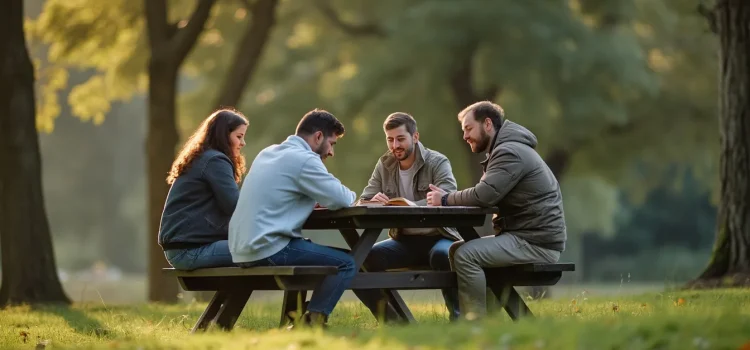

This article is an excerpt from the Shortform book guide to "Faith Still Moves Mountains" by Harris Faulkner. Shortform has the world's best summaries and analyses of books you should be reading.
Like this article? Sign up for a free trial here.
Have you experienced faith bringing people together? What role does God play in strengthening relationships?
In her book Faith Still Moves Mountains, Harris Faulkner explores how God brings people together and strengthens bonds within communities and families. She shares inspiring stories of individuals whose faith has helped them overcome challenges and forge deeper connections with others.
Keep reading to discover how faith in God can transform relationships and build stronger communities.
God Brings People Together
In her book, Faulkner shows how God brings people together in two significant ways:
- God helps communities come together.
- God helps friends and family grow closer.
Community Relationships
Faulkner’s stories show that faith strengthens ties by encouraging people to come together as a community. In contexts like a church service, Bible study, or prayer group, people can connect over their shared faith or pray toward a common goal. In addition, faith often drives people to help others through charitable acts and other good deeds, forging new ties and building community.
(Shortform note: Some researchers argue that while God and faith can help strengthen communities, the reverse is also true—a lack of faith can cause communities to decline and pull people apart. They explain that God and religion provide a foundation for the norms and morality of a given society. Without this foundation, people will rely on their personal moral code—or lack thereof—making them more individualistic and selfish. And without the opportunity to meet and spend time with others in the community at church functions, people also don’t know each other as well and have less support in their lives.)
For example, Faulkner tells a story of a woman named Lisa Martin, whose family and friends came together to pray for her recovery when she came down with an extremely serious case of Covid-19. Lisa’s husband Jeff describes how many distant friends and family members reached out as a show of support or to offer him advice on how best to navigate the health care system. Lisa eventually recovered, in no small part because of their collective faith, prayer, and communal support.
(Shortform note: Research suggests that Lisa’s experience isn’t unique—faith and religion have played an important role in helping people through the Covid-19 pandemic, whether or not they’ve been infected. Specifically, studies show that religion may have helped people cope with the stress of the pandemic and in some cases helped mobilize people to prevent the disease from spreading further. For example, churches in the Philippines assisted in efforts to distribute food and protective equipment to the poor and homeless during the pandemic.)
Personal Relationships
Faulkner also tells stories of how faith in God can strengthen personal ties, allowing family and friends to grow closer. Several of her stories detail friends, family, and neighbors coming together to pray for a specific outcome—someone overcoming their intense depression, for example—and supporting one another, getting closer in the process. Christian faith also teaches the power and importance of forgiveness. This can help people forgive friends and family who harmed them in the past, allowing them to grow close once again.
(Shortform note: Rick Warren (The Purpose Driven Life) explains in more detail how faith helps you grow closer with family and friends. He suggests that by helping one another process spiritual questions, concerns, and doubts—in a Bible study or prayer group, for example—you practice being honest, supportive, and trusting. These qualities then transfer to your relationships more broadly, allowing you to grow closer or have an easier time forgiving one another.)
For example, Faulkner tells the story of Nancy, who was abused by her alcoholic mother as a child. Finding Jesus and learning about God’s universal love helped Nancy recover from her traumatic past. Then, Nancy was able to recognize that her mother’s own trauma had influenced her behavior. Nancy forgave her mother, praying she would also discover God’s love and be healed. Many years later, Nancy’s mother did exactly that.
(Shortform note: Religious authors and scholars explain that the Christian conception of forgiveness isn’t the same as letting those who have hurt you off the hook or reconciling with them. Forgiveness means no longer holding anger, bitterness, or vengeful desires toward them. However, you can get rid of these negative emotions while still believing that whatever behavior hurt you was wrong and taking steps to make sure you aren’t hurt again. And while we often reconcile with the people we forgive, this isn’t a necessary part of forgiveness—if someone hurts you too much or refuses to apologize for their behavior, you can forgive them while never growing close with them again.)
Exercise: Reflect on the Role of Faith and God in Your Relationships
Consider how God and faith have impacted, or might impact, your life in a positive way.
- How has your spiritual life strengthened your personal relationships? How has it strengthened your relationship with your community? For example, maybe you connect with a grandparent by attending church services with them.
- If God and faith are not part of your life, why have you chosen this path? What, if anything, might prompt you to change it?

———End of Preview———
Like what you just read? Read the rest of the world's best book summary and analysis of Harris Faulkner's "Faith Still Moves Mountains" at Shortform.
Here's what you'll find in our full Faith Still Moves Mountains summary:
- Real-life stories about how God responds to prayer and faith
- How faith can impact people’s lives in miraculous ways
- Why God still matters in our modern, more secular world






